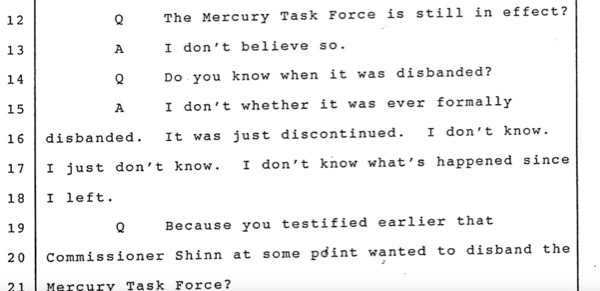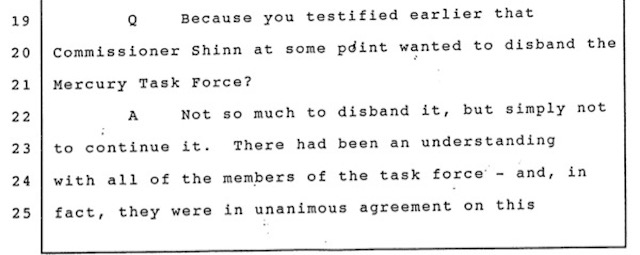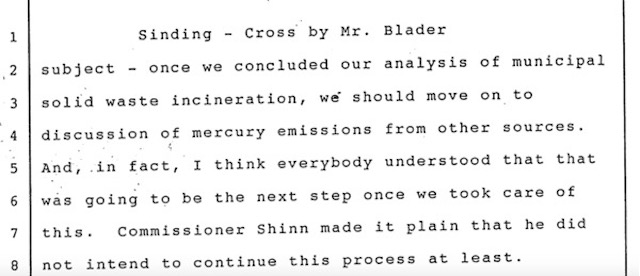Whitman Lies Go Unchallenged and Become False History
I was just doing some research on former Assemblywoman Maureen Ogden’s (R-Essex) 1994 “Household Hazardous Waste Management Act” proposed legislation (A973) – which I helped draft while a DEP professional – and came across this rats nest of egregious lies submitted by former Gov. Christie Whitman to the US Senate Environment Committee in response to our testimony criticizing her environmental record in NJ. (transcript)
Governor Whitman raised the statewide total waste stream recycling goal from 60 percent to 65 percent. All 21 of our counties now operate permanent or periodic systems for the collection and proper disposal of household hazardous waste. DEP has advanced “Universal Waste” management to collect fluorescent bulbs, thermostats, switches, consumer electronics and other products which contain heavy metals, including mercury. We continue to implement our “Toxic Packaging Reduction Act” and “Dry Cell Battery Management Act” to reduce toxics in packaging and collect batteries which contain mercury and other heavy metals. Finally, New Jersey has the most stringent standards in the country for mercury emissions control at the five energy recovery incinerators which operate in the State and we have nearly c mpleted our second assessment of mercury in the environment through a Mercury Task Force stakeholder process.
So lets interrogate the history and take those egregiously false claims one by one:
1. “Governor Whitman raised the statewide total waste stream recycling goal from 60 percent to 65 percent.”
No she didn’t. The is false – the facts:
The Florio DEP, based on recommendations by the Florio created Emergency Solid Waste Assessment Task Force, proposed increasing aggressive recycling rates and mandating County Household Hazardous Waste Management programs. The Task Force’s recommendations were for a total waste stream recycling rate that exceeded 65%, although DEP initially adopted a 60% in the initial Solid Waste Plan Update. That minimum 60% rate was based upon a material specific technical analysis. DEP held counties accountable to that 60% rate as a minimum. (see below), and sought higher rates based on county waste streams and proposed management plans. Whitman’s alleged increase from a 60% rate to a 65% rate changed absolutely nothing.
Whitman installed Assemblyman Robert Shinn as DEP Commissioner. Shinn opposed the Florio DEP Solid Waste Plan and sponsored a Concurrent Resolution to kill the Plan. Shinn was pro-incineration and opposed to DEP State mandates to Counties.
For Whitman to attempt to take credit for increasing recycling goals that originated in a State solid waste plan her own DEP Commissioner sought to kill is incredible chutzpa.
Whitman’s DEP Commissioner Bob Shinn, a former Republican legislator and his Republican colleagues, opposed the Florio DEP policies and Solid Waste Plan (see this). Shinn was the sponsor of the Assembly version of the same Resolution to strike down the Florio Solid Waste Plan.
The Florio DEP proposed and adopted amendments to the NJ Solid Waste Management Plan to implement these recommendations. The NY Times reported:
New Jersey officials should set a goal to recycle 60 percent of the state’s garbage by 1995, a task force commissioned by Gov. Jim Florio recommended today. [a state mandated rate, from the prior 25% voluntary rate].
The recycling goal would be the most ambitious in the nation, and would reduce New Jersey’s need to build incinerators to burn garbage, said the preliminary report of the Emergency Solid Waste Assessment Task Force.
Governor Florio said his task force would try to ”reverse the approach that we’ve had in the state for the last 10 or 15 years, which is to build incinerators first.” He said they should be ”a last resort, not the first resort.”
The Whitman DEP Commissioner,Robert C. Shinn, OPPOSED these Florio policies in his capacity as Chairman of the Assembly Solid Waste Committee and later as Whitman’s DEP Commissioner.
The good news in the report on recycling, which was released on July 6, has led to a new round of debate on whether the state needs to proceed with the 17 incinerators proposed around the state. Environmentalists say that the report bolsters their contention that incineration is unnecessary, since New Jersey residents are proving that a vast majority of the products that now end up in the waste stream can be recycled.
But this was Whitman DEP Commissioner Shinn’s position at the time: (NY Times)
Proponents of incineration, however, say it is safe and efficient since emissions are strictly monitored to make sure they are environmentally sound and that it reduces the volume of the solid waste that must be placed in landfills by as much as 75 percent.
The Counties implemented HHWM programs as a result of DEP mandates and reasons to the State Solid Waste Management Plan (see footnote #6):
Mercer County has endorsed the state-mandated goals to recycle 50% of its
municipal solid waste stream and 60% of the total waste stream. The County has adopted a source reduction strategy that includes capping per capita waste generation by 1995, reducing total waste generation by 2000, conducting waste audits, a household hazardous waste collection and education program, and a per container rate fee structure program.6
The Florio Taskforce recommended greater than the 60% recycling rate that was included in the DEP 1994 Plan Update. The Florio DEP considered the 60% recycling rate as a minimum, and urged counties to go beyond that:
After opposing this, the Whitman DEP simply followed the Florio DEP lead.
2. “All 21 of our counties now operate permanent or periodic systems for the collection and proper disposal of household hazardous waste.”
These County HHWM programs were established and funded based on policies of the Florio DEP, particularly toxics source and use reduction initiatives like the Dry Cell Battery Management Act and the Toxic Packaging Reduction Act. Those were legislative initiatives sponsored by Democrats and opposed by Shinn and Republicans.
Whitman’s DEP Commissioner Shinn supported them as county programs a legislator in Burlington County, but opposed them on a statewide basis as mandates by DEP and sought to kill the DEP HHWM program.
Florio’s Mercury Task Force also recommended these programs as ways to reduce toxic incinerator lead and mercury emissions. Upon assuming DEP Commissioner, Shinn effectively disbanded the Mercury Task Force and sabotaged its recommendations.
3. “DEP has advanced “Universal Waste” management to collect fluorescent bulbs, thermostats, switches, consumer electronics and other products which contain heavy metals, including mercury.
The “Universal Waste” framework was a federal EPA policy designed to provide regulatory relief and allow low cost management solutions to high volume industrial wastes as an alternative to more stringent and costly federal RCRA hazardous waste management regulations.
NJ DEP reacted to this federal EPA regulatory relief initiative to try to do damage control and limit its scope in NJ.
In contrast to this EPA federal rollback, the more stringent NJ based program to “collect fluorescent bulbs, thermostats, switches, consumer electronics and other products which contain heavy metals, including mercury” was created based on the Florio Solid Waste Assessment Taskforce and Mercury Emissions Task Force recommendations and State laws Florio pushed, i.e the Toxic Packaging Reduction Act and Dry Cell Battery Management Act.
Whitman had absolutely nothing to do with any of that.
To the contrary, Whitman’s DEP Commissioner Robert C. Shinn OPPOSED these policies and laws as a NJ Legislator and Chairman of the Assembly Solid Waste Committee.
4. “We continue to implement our “Toxic Packaging Reduction Act” and “Dry Cell Battery Management Act” to reduce toxics in packaging and collect batteries which contain mercury and other heavy metals.”
These laws were initiated by the Florio Administration and Democratic legislature and OPPOSED by Whitman’s DEP Commissioner Robert Shinn, a former Republican Assemblymen form Burlington County.
I was hugely involved in developing and drafting both bills s DEP’s Solid Waste Legislative liaison.
5. “New Jersey has the most stringent standards in the country for mercury emissions control at the five energy recovery incinerators which operate in the State.”
These mercury air pollution control emission standards were developed by the Florio DEP, based upon recommendations of the Florio Solid Waste Assessment Task Force and Mercury Emissions Taskforce created by Florio’s Executive Orders. The Florio Mercury Task Force recommended:.
Remove mercury from products and phase out sales of mercury-containing products for which there are reasonably available alternatives. In order to accomplish this, New Jersey should:
Adopt legislation that reflects the provisions of the Mercury Education and Reduction
Model Act prepared by the Northeast Waste Management Officials’ Association (NEWMOA), as part of the New England Governors’ Mercury Action Plan. This plan addresses mercury-containing products, such as thermometers, thermostats, switches (including those in motor vehicles and appliances), and fluorescent lights, and limits the sale of mercury to approved purposes.
Develop effective outreach and education on the importance of removing mercury from products. County household hazardous waste programs should play a key role in this effort.
These recommendations and implementing legislation and DEP plans and regulations were OPPOSED by Whitman’s DEP Commissioner Robert C. Shinn in his capacity as a Republican Legislator and Chairman of the Assembly Solid Waste Committee. Shinn was a pro incinerator legislator who supported County primacy, as was Whitman. Shinn later abandoned these policies as Whitman;s DEP Commissioner.
Furthermore, and even worse, Gov. Whitman was involved in a scheme to block implementation of these recommendations and mercury standards and their expansion to coal fired power plants.
Whitman and Shinn disbanded the Florio Mercury Emissions Taskforce and actively suppressed science on high levels of mercury in statewide freshwater fish. For publicly disclosing this scheme, I was related and forced out of DEP as a whistleblower.
6. “… we have nearly completed our second assessment of mercury in the environment through a Mercury Task Force stakeholder process.”
Total lie. See sworn testimony below, but let me first explain.
Whitman’s DEP Commissioner Shinn disbanded Gov. Florio’s Mercury Taskforce, failed to followup on their work, and suppressed science on mercury risks to public health.
Whitman and Shinn failed to continue the work of the Florio DEP on mercury controls, including the need to issue public health advisories on fish consumption and impose new emission standards on coal fired power plants, which were later imposed by the McGreevey DEP.
Here is sworn deposition testimony of 9/21/94 by DEP Assistant Commissioner Sinding exactly on the issue:
All this is history and exposes the LIES of Christie Whitman.
End Note – these egregious lies were drafted by Whitman aid John Spinello, I suspect with the help of Shinn’s Deputy Gary Sondermeyer. Sadly, both these hacks are still actively involved in NJ policy circles.




